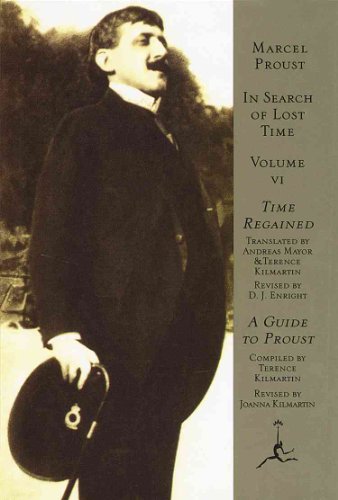Items related to In Search of Lost Time: Time Regained v. 6 (Modern...

"synopsis" may belong to another edition of this title.
Time Regained opens with Marcel visiting Gilberte, for whom he had entertained an adolescent passion. Realising that the places he loved as a child have lost their charm for him, he also reaffirms that he has a "lack of talent for literature"--the possibility of becoming a writer seems to him to be impossible. The remainder of the first half of the volume details the devastations of the First World War, which transforms Paris and the social world Marcel had known, destroying the distinctions, hierarchies and certainties that had previously existed. Many years later, he returns to Paris, and his speculations on memory--that "the true paradises are the paradises we have lost"--begin to awaken in him a sense of how he might at last answer the calling of being a writer that had first impressed itself upon him as a child. But when he revisits the social circles which had once so entranced him, he is appalled at the changes wrought by the passing of years:
I had made the discovery of this destructive action of Time at the very moment when I had conceived the ambition to make visible, to intellectualise in a work of art, realities that were outside Time.It is the moving resolution of this problem that closes the book, and closes one of the supreme acts of literary creation of the 20th century: in its ending we are taken back to the beginning, to experience the variety and complexities of human life again, transmuted into art. --Burhan Tufail
"Sublime... In Proust's interweaving of romantic delusions, the glory of the descriptions, as the narrator strives to recapture the past, redeems everyone" (John Updike)
"The way he replicates the workings of the mind changed the art of novel-writing forever...his style is extraordinary, enveloping, captivating" (Guardian)
"Proust isn't just the most profound of novelists, but the most entertaining, too. No reader ever forgets his most killingly funny scenes... Proust sinks deepest in readers because the book is so exhaustively analytical, so ceaselessly truthful. Not the least of it is the book's heavenly length, so that it inevitably takes over your life for a long stretch... the experience of reading it becomes, in itself, an unforgettable thing" (Independent)
"Surely the greatest novelist of the 20th century" (Sunday Telegraph)
"About this title" may belong to another edition of this title.
- PublisherRandom House Inc
- Publication date1997
- ISBN 10 0679424768
- ISBN 13 9780679424765
- BindingHardcover
- Number of pages749
- Rating
Buy New
Learn more about this copy
Shipping:
£ 3.20
Within U.S.A.
Top Search Results from the AbeBooks Marketplace
In Search of Lost Time, Volume 6: Time Regained, A Guide to Proust
Book Description Hardcover. Condition: new. New. Fast Shipping and good customer service. Seller Inventory # Holz_New_0679424768
In Search of Lost Time, Volume 6: Time Regained, A Guide to Proust
Book Description Hardcover. Condition: new. New Copy. Customer Service Guaranteed. Seller Inventory # think0679424768
In Search of Lost Time, Volume 6: Time Regained, A Guide to Proust
Book Description Hardcover. Condition: new. New. Seller Inventory # Wizard0679424768
In Search of Lost Time, Volume 6: Time Regained, A Guide to Proust
Book Description Condition: new. Seller Inventory # FrontCover0679424768
In Search of Lost Time, Volume 6: Time Regained, A Guide to Proust
Book Description Hardcover. Condition: new. Prompt service guaranteed. Seller Inventory # Clean0679424768
In Search of Lost Time, Volume 6: Time Regained, A Guide to Proust
Book Description Condition: new. Seller Inventory # Hafa_fresh_0679424768
In Search of Lost Time, Volume 6: Time Regained, A Guide to Proust (v. 6)
Book Description Hardcover. Condition: New. Seller Inventory # Abebooks127775
IN SEARCH OF LOST TIME, VOLUME 6
Book Description Condition: New. New. In shrink wrap. Looks like an interesting title! 1.42. Seller Inventory # Q-0679424768
Time Regained: A Guide to Proust
Book Description Hardcover. Condition: Brand New. revised subsequent edition. 768 pages. 7.25x5.00x1.75 inches. In Stock. Seller Inventory # 0679424768
In Search of Lost Time, Volume 6: Time Regained, A Guide to Proust
Book Description Hardcover. Condition: New. Brand New!. Seller Inventory # VIB0679424768

